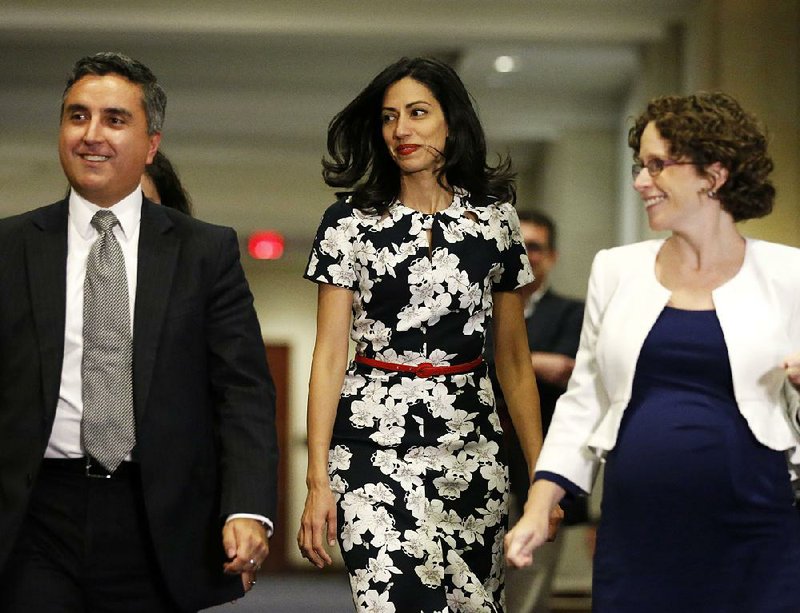WASHINGTON -- A special Republican-led House panel questioned a longtime aide to Hillary Rodham Clinton about the deadly 2012 attacks in Benghazi, Libya, despite Democrats' insistence that Huma Abedin had little knowledge about details of the terror strikes.
Abedin, the committee staff and a few lawmakers met behind closed doors for several hours Friday at a session focused on the Sept. 11, 2012, attacks that killed four Americans, including U.S. Ambassador J. Christopher Stevens. Clinton, who is running for the Democratic presidential nomination, is to appear Thursday before the panel.
Rep. Lynn Westmoreland, R-Ga., said questions to Abedin focused on the Benghazi attacks but also touched on Clinton's use of a private email account and server while serving as secretary of state.
"If it had something to do with Benghazi and an email, then that was asked. If it wasn't about Benghazi, it wasn't asked," Westmoreland told reporters.
The decision to question Abedin angered the panel's top Democrat, Rep. Elijah Cummings of Maryland, and the Clinton campaign.
"She had no policy responsibilities, no operational responsibilities and was not with Secretary Clinton on the night of this phenomenal tragedy," Cummings told reporters after breaking away momentarily from the day's proceedings.
Abedin is vice chairman of Clinton's campaign and was a top State Department aide when Clinton served as secretary of state. She also worked in Clinton's Senate office.
In a statement, the campaign suggested that calling Abedin as a witness was a fresh sign of the panel's partisanship.
"The committee's focus on Huma (as opposed to numerous intelligence and defense community officials still outstanding) is additional evidence that the actual attack in Benghazi, and its lessons about how we might better protect diplomats serving in dangerous places, are the last things on the committee's mind," Nick Merrill, a campaign spokesman, said in a statement.
Republicans have defended the panel's $4.5 million, 17-month probe as the committee comes under intense scrutiny after two House Republicans described its work as partisan and aimed at hurting Clinton's presidential bid, a characterization the panel's chairman rejects.
Rep. Trey Gowdy, R-S.C., did not attend Friday's session in which committee staff and attorneys questioned Abedin. Republicans Westmoreland and Rep. Mike Pompeo of Kansas did attend the meeting, as did Cummings.
Asked about Gowdy's absence, spokesman Jamal Ware said, "no particular reason," and later added that the chairman discusses the questions with staff in advance and trusts his colleagues to pursue them.
The Benghazi panel interviewed two other top Clinton aides, Cheryl Mills and Jake Sullivan, last month.
Also on Friday, a federal judge heard arguments on whether to dismiss charges against a suspected Libyan militant accused in the Benghazi attack.
U.S. District Judge Christopher Cooper, an appointee of President Barack Obama, did not immediately rule on the motions but appeared almost certain to keep the case against Ahmed Abu Khattala moving toward trial.
Khattala, captured by U.S. special forces in Libya in a nighttime raid in June 2014 and then questioned for days aboard a Navy vessel, appeared in court wearing a green prison suit. He listened silently to the proceedings through earphones as an interpreter translated the arguments.
An 18-count indictment charges Khattala with crimes including murder of an internationally protected person, providing material support to terrorists and destroying U.S. property while causing death. He has pleaded innocent, and prosecutors said Friday that they expected a decision within months on whether the Justice Department would pursue the death penalty.
Defense lawyers laid out multiple challenges to the indictment.
Mary Petras, one of Khatalla's attorneys, urged Cooper to dismiss the two counts accusing her client of providing support to terrorist groups. Though that statute is a favored prosecution tool, particularly in its cases against U.S. followers of the Islamic State, Petras said the charges in this case are vague about exactly who is a terrorist and what sort of action could be labeled terrorism. That makes the charge unconstitutional, she said.
"Essentially what the government is saying to the court is 'Leave it to us. We know when to use the statute,'" Petras said.
Defense lawyers also urged Cooper to dismiss other counts, such as carrying and firing a firearm during a crime of violence, that were brought under laws they said were specifically intended by Congress to cover domestic crimes, not ones that occur overseas.
"The court should not stretch the ... presumption that they don't apply to make them apply here," said defense lawyer Jeffrey Robinson.
Though Cooper did not reveal how he would rule, he posed several questions to prosecutors -- including how the government thought it should draw the line on extending its reach into foreign countries -- that suggested that the argument resonated with him.
Information for this article was contributed by Eric Tucker of The Associated Press.
A Section on 10/17/2015

